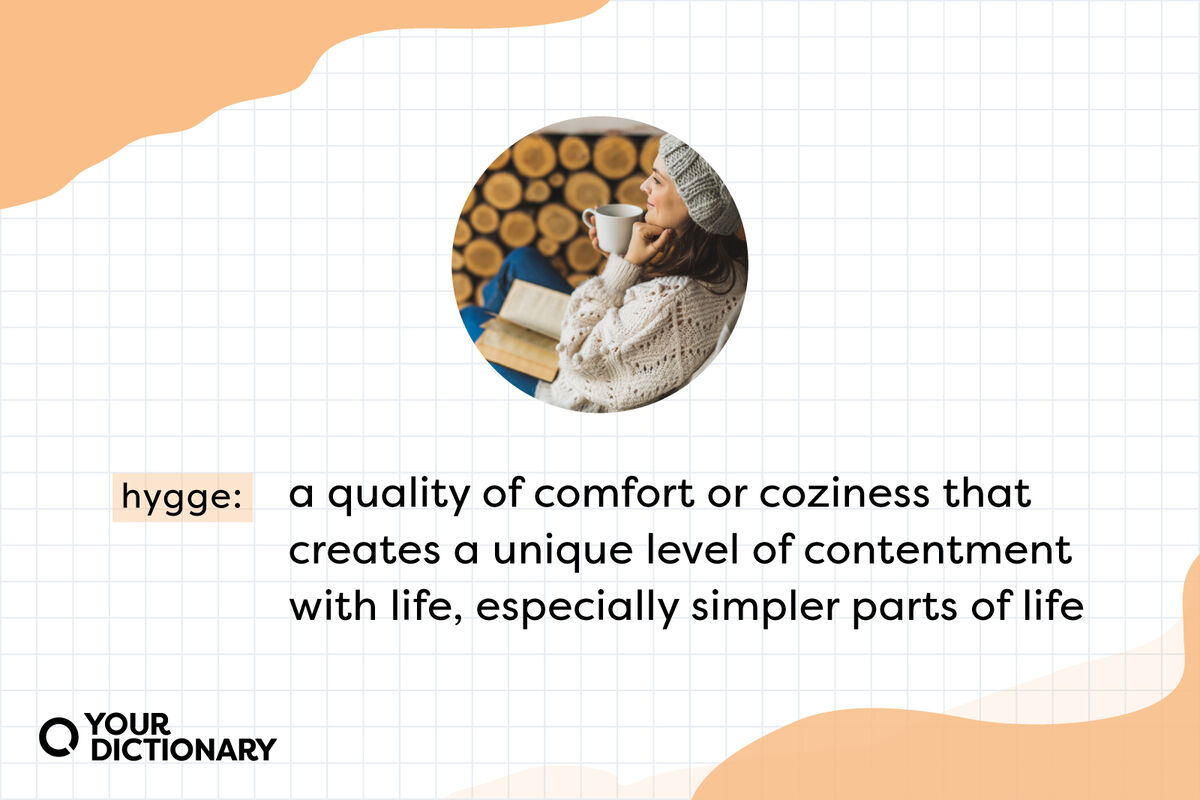
If you’ve spent any time online during the fall and winter seasons, you’ve probably stumbled upon the word hygge. To the uninformed, it can be a strange word to look at, but in reality, it’s one of the coziest, comfiest concepts to ever come into your life.
What Does “Hygge” Mean?
Hygge is one of those non-English words that doesn’t have an exact equivalent in English. The word comes to us by way of Denmark and Norway. The closest meaning involves comfort or coziness, but it’s generally much broader than that, referring to "a quality of comfort or coziness that creates a unique level of contentment with life, especially simpler parts of life."
It’s the good, warm, cozy feelings that come from a good bowl of soup or spending time with friends.
"Hygge" as a Noun
As a noun, hygge refers to the actual feeling of comfort and coziness.
- Wrapping myself in blankets and talking to my crush filled me with hygge.
- Her friends delivered her hygge by way of many hugs and a large pepperoni pizza.
- All they needed to feel hygge was a good book and a scented candle.
"Hygge" as an Adjective
Hygge can also act as an adjective to describe a thing that inspires or engenders that feeling of contentment. It’s often synonymous with cozy or comfortable.
- She loved her extremely hygge blanket on those chilly winter nights.
- The hygge blankets were a real balm to their tired souls.
- The sweater was so hygge that I fell asleep in class without meaning to.
How To Pronounce “Hygge”
Hygge is pronounced like “HOO-gah.” The right hygge pronunciation might seem weird to the average English speaker, like we’re missing out on a few letters there. If you’re not a fluent Danish speaker, you might look at the word and pronounce it like “hee-geh”, but now you know.
The Origins of "Hygge"
Tracking any sort of word origin is a challenge, but that gets even more muddled with borrowed words that aren’t directly translatable in English. Hygge is something more of a philosophy or state of mind, but where did we even get it?
- The official site for the country of Denmark states that various definitions of hygge existed in the Middle Ages, including an Old Norse variation that meant “protected from the outside world.”
- The modern form of hygge that we know apparently goes as far back as the 1800s.
- It’s hard to pinpoint when exactly hygge crossed over to America, but it appeared in print in a 1960 issue of the Capital Times in Madison, Wisconsin.
- Most recently, hygge caught on around 2016 when it was shortlisted as a Word of the Year by the Oxford Dictionaries.
Ever since then, hygge coincidentally hits a search peak every winter.
Words Potentially Related to “Hygge”
While hygge as an ideal or concept is unique, it does share some etymological similarities with other words in Danish and other languages.
Hyggebukser (Danish)
Hyggebukser combines the concept hygge with bukser, the Danish word for pants. Think of hyggebukser as your favorite pair of cozy sweatpants that maybe have one too many chip stains to be worn in public but are otherwise the pants that you live in when you’re at home.
Hyggekrog (Danish)
Krog is a Danish word that means “corner.” A hyggekrog is equivalent to a nook in your home where you can curl up with a blanket and your favorite book and spend hours of guilt-free time away from the troubles of the universe.
Hugga (Icelandic)
Hugga is an Icelandic word that means “to comfort, console, or soothe.” It’s a verb here, but you can see the similarities between hugga and hygge, both in meaning and idea.
Hug (English)
Nothing beats being clasped between two strong arms. There is some speculation that hug and hygge both come from the same Old Norse word hugge (similar to hugga above). It’s hard to find any actual evidence of this, but it’s hard to argue that a warm embrace wouldn’t fill you with hygge.